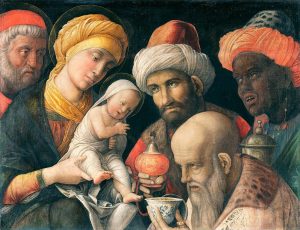Thoughts on Sunday’s Lessons for Jan. 2 2022 (Christmas 2)
First Reading: Jeremiah 31:7-14
Sunday is the Ninth Day of Christmas! We still have a few days to wish friends and family a Merry Christmas before we turn to Epiphany, then Lent, Holy Week and Easter.

“The Adoration of the Magi (c.1500), painting by Andrea Mantegna (1431-1506). The J. Paul Getty Museum, Los Angeles. (Click image to enlarge.)
Our readings for the Second Sunday after Christmas speak of thanksgiving, hope, and joy. Even this first reading from Jeremiah – whose prophecy is usually filled with warnings of destruction and despair – resounds with shouts of praise and joy this day. The prophet offers hope for all of God’s people, even those weeping in sorrow and pain. God will comfort all, turn our sorrow into gladness, our mourning into joy.
Psalm: Psalm 84
Psalm 84 echoes our Jeremiah reading in its joy. Specifically, it sings the delight of worshipping in the rebuilt temple whose destruction and restoration the Prophet Jeremiah had foretold. Even amid the celebration of having the building restored, though, the Psalm makes clear, real exultation is not bound by bricks and mortar but rests on the grace and glory found in encountering God.
Second Reading: Ephesians 1:3-6, 15-19a
Mirroring the reassuring theme that we heard in last Sunday’s reading from Galatians, the author of the letter to the Ephesians emphasizes that we are all adopted as God’s children through Jesus. Through this adoption, the letter assures us, we are freely given God’s grace, a glorious inheritance of great spiritual riches that offers hope.
Gospel: Matthew 2:13-23
Think about the sad and sometimes terrifying images of refugees that have filled the news in recent years: Parents and their children risking their lives in the long, dangerous journey to El Norte. African immigrants drowned in capsized ships on the Mediterranean. Afghans fleeing the dangers of a dissolving nation. Being a refugee can be hard, frightening, sometimes fatal. Now think about Joseph and Mary in Matthew’s Gospel: They are terrified, running away to a foreign land to escape the threat of their own baby’s death at the hands of an angry King Herod. What parents would not go to such an extreme to protect their precious child? And what child, living through such an experience, would not forever remember to care for the widow, the orphan and the stranger?
Gospel (Alternate Reading): Luke 2:41-52
The gospels tell us almost nothing about Jesus’s childhood and youth. This intriguing gap is filled by this short, fascinating story that appears only in Luke’s Gospel. Twelve-year-old Jesus disappears while the family is in Jerusalem, to the horror of Joseph and Mary, who find him three days later in the Temple, impressing the elders with his intelligent discussion. The child reassures his frantic parents, declaring that his place is in his “Father’s house,” the Temple. In the next chapter, in Luke’s account of the baptism of the 30-year-old Jesus by John the Baptist in the Jordan, we will hear the voice of God announce that Jesus is God’s beloved Son.
Gospel (Alternate Reading): Matthew 2:1-12
This Gospel passage offers a preview of the feast of the Epiphany, as we hear Matthew’s account of the wise men from the East (“Magi,” or literally “magicians” in the original Greek). Matthew tells the fascinating tale of astrologers summoned to the infant Messiah by a shining star; verses from the prophet Micah that seemed to foretell the future king’s birthplace in Bethlehem, and a suspicious, sneaky King Herod who plots to use the Magi to track down the baby. (You’ll notice that the Magi found the holy family in a house, not a manger … it is only Luke’s Nativity story that places them with the shepherds, cattle and sheep.)
